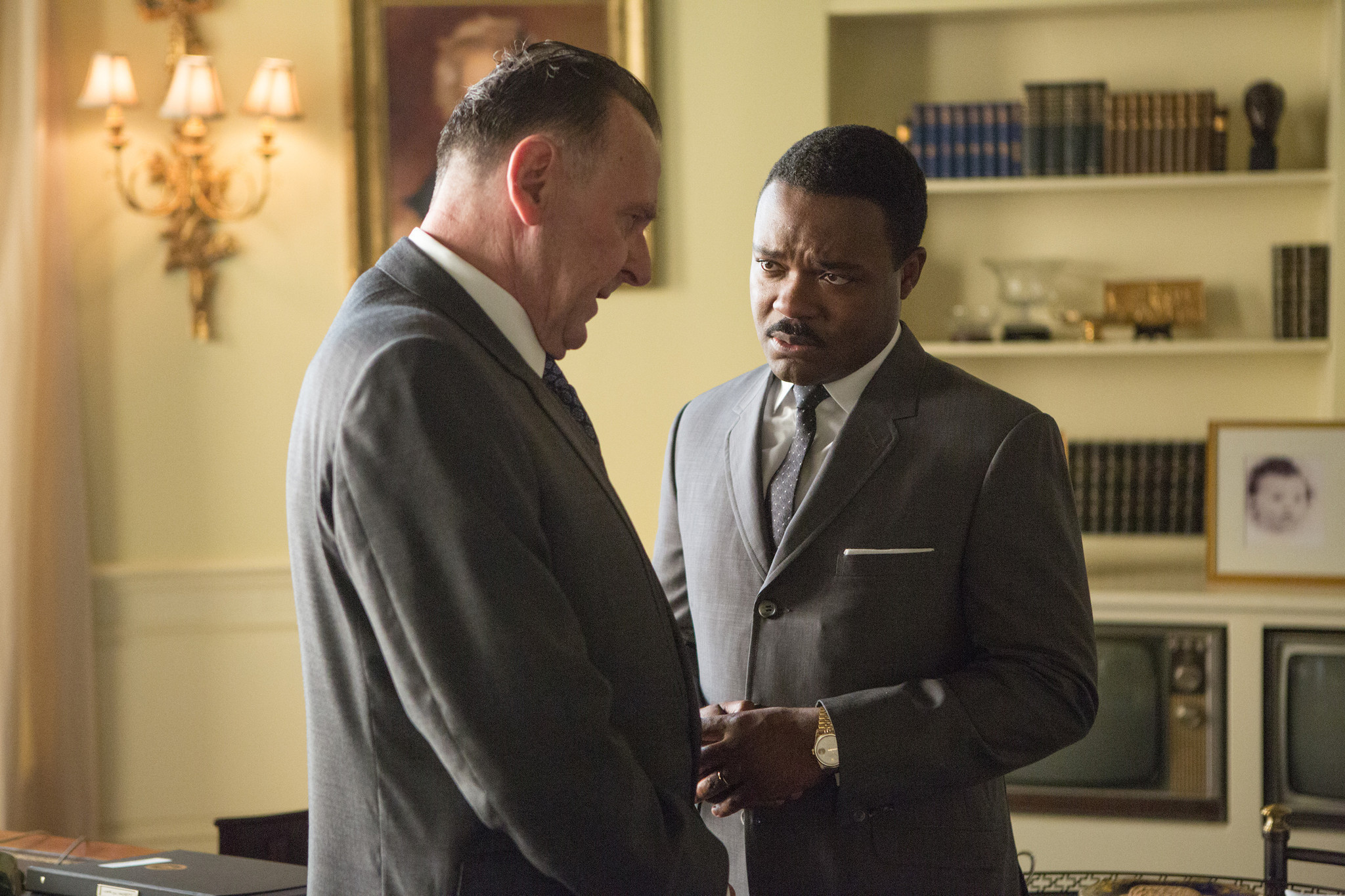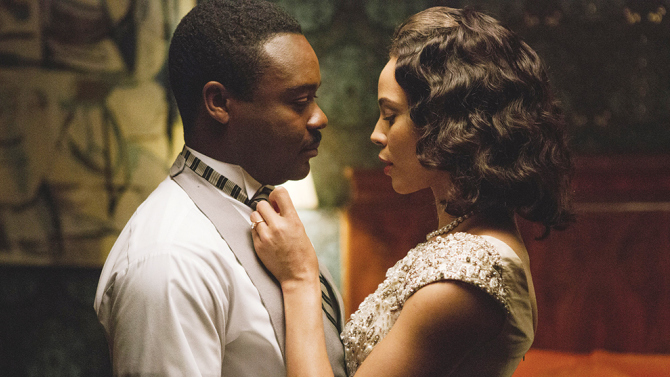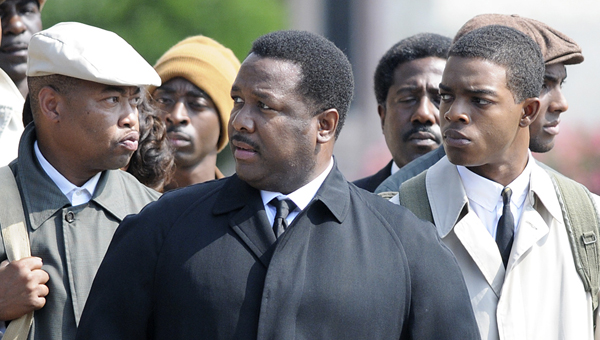Selma
 Scott Pfeiffer
Scott Pfeiffer  Monday, January 19, 2015 at 12:01PM
Monday, January 19, 2015 at 12:01PM 
On a recent trip to Washington D.C., I walked around the tidal basin from the Jefferson Memorial to the Martin Luther King, Jr. Memorial. Jefferson's stirring words echoed in my mind as I walked, those bold, radical Enlightenment ideas about freedom, equality, inalienable rights. I passed through the FDR memorial before reaching Dr. King's. I stood before his wall of quotes, including words from his address upon accepting the Nobel Peace Prize in Oslo, Norway in 1964, which is where "Selma" begins.
I must say I felt proud, as if as I walked I could feel Jefferson's words being made reality, through struggle and the passage of time. Then Ferguson happened, and Cleveland, and Eric Garner's choking death. Suddenly, what I'd felt on my walk felt too much like a lie.
It was into this maelstrom that "Selma" was released. So you see that while the events it depicts occurred 50 years ago, this picture couldn't be more urgent.

When we join King (David Oyelowo) in Oslo, it is in an private moment before his speech, getting bucked up his wife, Coretta Scott King, played with great dignity by Carmen Ejogo. These quiet moments are among the film's best. Screenwriter Paul Webb has imagined intimate conversations which allow us to glimpse the exchanges of strength that buoyed these most public of figures when they were weary, the intimate foundations for the rousing public moments with which we are so familiar.
In a Selma jail Dr. King is given strength by the encouragement of Ralph Abernathy (Colman Domingo). Filmed in rich chiaroscuro by cinematographer Bradford Young, the faces of the nameless many--the movement behind these men--are there in the jail with them, hidden in the shadows. My favorite scene is a quiet nighttime drive. As the car rolls gently through the night, young John Lewis of SNCC, who'd been impudent and brash with Dr. King, confides in him that he is his hero. There's a more painful private moment: Coretta play Dr. King a sex tape sent courtesy of the FBI. (Throughout the film FBI memos reveal how the authorities surveilled these "subversives.")
There has been controversy over how the film portrays Lyndon B. Johnson (Tom Wilkinson) during his backroom wheeling and dealing with King. Critics point out that without Johnson there would have been no civil rights legislation, and that the film shows a Johnson bent on putting a voting rights law on the back burner, when in reality he wanted such a law all along. The criticism is fair, but it seems to me that Webb's and Wilkson's characterization of Johnson resonates with what we know of LBJ's roughhouse style. A late scene between Johnson and segregationist Alabama Governor George Wallace (Tim Roth) feels particulary honest, like the way these two men would truly talk when the cameras were off. More importantly, the treament of Johnson seems in keeping with DuVernay's larger theme or point: that social change comes from the grassroots, with elected officials not out in front but having to be dragged along.

"Selma" is about the marches that led to the Voting Rights Act of 1965. Oprah Winfrey plays Annie Lee Cooper, who goes to register to vote. The Civil Rights Act of 1964 had made it legal for blacks to vote, and she is prepared for the test she knows is coming. When the registrar asks her how many judges there are in the county, she knows the answer: 67, as I recall. But then he asks her to name them. These kind of bogus exams show us why the Voting Rights Act was needed, and one would do well to consider the price in blood that was exacted to get it when thinking about Republican attempts to roll it back.
If marches led to the passage of the Act, it was violence and murder that was the catalyst for the marches. One could say the film truly begins with the murder of the four little girls in the Birmingham church, whom DuVernay has been careful to sketch true to life. We see them descend the stairs of their church, and we hear the explosion. The police murder of a young activist, Jimmy Jackson, after a night march in Marion is depicted in a heart-stopping scene. A quiet scene of King comforting Jackson's grieving grandfather is one of the film's best. And there is more violence: we see the murder of James Reeb, a white minister from Boston, beaten to death for coming down for the marches.
The film shows a media-savvy King. He knew that it was media coverage of the authority's violence against blacks that would turn the tide of public opinion, pictures of people being set upon by police dogs and hoses. There had to be cameras. People had to see to understand the depths of hatred.
DuVernay's staging of Bloody Sunday is riveting. Her camera hovers over Edmund Pettis Bridge and we feel queasy suspense, the charge of a moment electric with history. We watch in horror as police storm defenseless men and women, beating them with clubs wrapped in barbed wire. The scene is as disturbing as it must be.

And so I thought of my walk in Washington as I watched the film. In Johnson's oval office, we see Washington and Jefferson look on from their portraits, as turmoil tests whether the nation they founded will be torn asunder, or if the union will be made whole, will one day live up to their promises. As Dr. King, Oyelowo is watchful, weary, defiant, angry, forgiving, loving. He conveys the music in King's voice that made him one of America's greatest orators. And he shows us Dr. King's capacity for healing and unifying, something his nation needs badly today.
(The soundtrack features Odetta’s stirring rendition of Dylan's “Masters of War” and the rousing original song "Glory" by John Legend and Common.)
Rating: *****
Key to ratings:
***** (essential viewing)
**** (excellent)
*** (worth a look)
** (forgettable)
* (rubbish!!)


Reader Comments